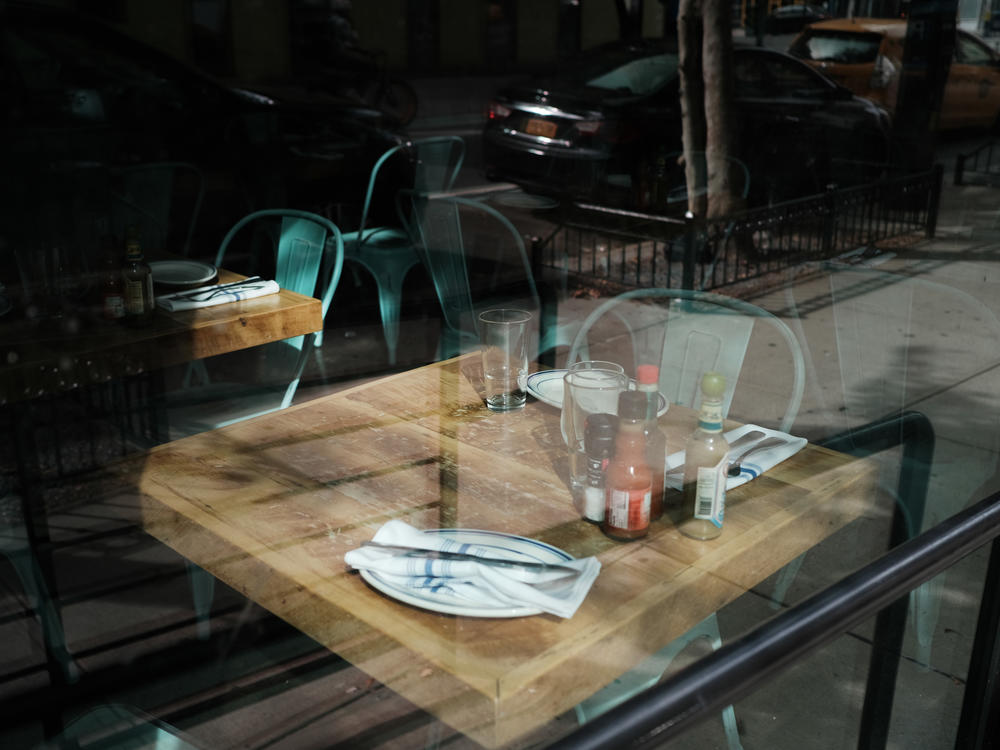Section Branding
Header Content
New York City To Resume Indoor Dining, With Restrictions, Later This Month
Primary Content
Months after it was tabled due to COVID-19, indoor dining is coming back to New York City.
New York Gov. Andrew Cuomo announced on Wednesday that restaurants can resume indoor service on Sept. 30 at 25% capacity and with other safety precautions in place.
"We want to thank New Yorkers for the increase in compliance," Cuomo said at a press briefing. "And because the compliance has gotten better we can now take the next step."
Restaurants and patrons will be required to follow strict safety protocols in this next phase.
Customers will have their temperatures taken at the door and must wear masks except while seated, and one member of each party must provide information for potential contact tracing purposes.
Restaurants must close by midnight and cannot offer bar service. They must also space tables 6 feet apart and meet air filtration requirements as specified by state guidance.
To enforce these rules, Cuomo said the city will ultimately provide some 400 inspectors to work alongside the state's compliance task force. Restaurants will be required to post their capacity outside, alongside a phone number for reporting violations.
Cuomo stressed that the future of indoor dining depends on the city's infection rate. If it goes up, indoor dining will be paused again. If it does not, the capacity limit may increase to 50%.
There is a Nov. 1 deadline to reassess capacity restrictions, but Cuomo said they could be eased at any point.
New York City currently has a positivity rate of 0.7%. Mayor Bill de Blasio said the city will "immediately reassess" if that number hits 2%.
"Science will guide our decision-making as we continue to monitor progress and health care indicators over the next three weeks to ensure a safe reopening," de Blasio said in a statement. "This may not look like the indoor dining that we all know and love, but it is progress for restaurant workers and all New Yorkers."
The mayor hit the pause button on indoor dining in early July. At the time, coronavirus cases were surging in many parts of the country, with many outbreaks linked to indoor bars and restaurants.
New York state, once the epicenter of the pandemic in the U.S., has managed to bring the virus under control considerably since the spring. As of Wednesday, the state has had an infection rate below 1% for 33 consecutive days.
Restaurants in the rest of the state have been able to open indoor dining at 50% capacity under the third phase of New York's reopening plan.
Cuomo said there have been some clusters tied to restaurants elsewhere in the state, which was part of the reason for the delay in New York City. He acknowledged the risks of concentrations of people indoors as well as the economic pressure that restaurants have been facing.
"A restaurant is not just the restaurant owner," he said. "A restaurant is the kitchen staff, the waitstaff, there's a whole industry around restaurants."
The industry has taken a significant financial hit from the pandemic.
A New York State Restaurant Association survey released this month found that nearly two-thirds of the more than 1,000 establishments contacted said they would likely close by the end of the year without some form of government relief.
The association cheered the announcement in a statement Wednesday, calling it an important step toward the industry's recovery.
"Allowing restaurants to open indoors at a limited capacity will provide these eateries with an economic lifeline as they all try to keep their doors open through this pandemic," said Melissa Fleischut, the association's president and CEO. "We will happily work with relevant governmental agencies and hospitality partners to ensure that all restaurants in New York City understand the rules."
Copyright 2020 NPR. To see more, visit https://www.npr.org.

